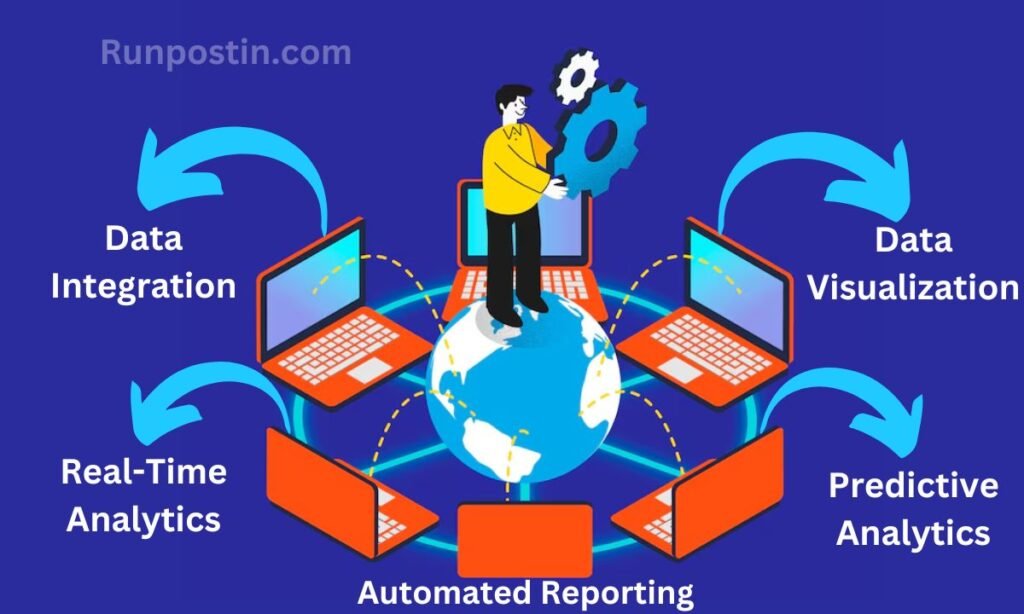
Hello Readers! In today’s rapidly evolving business landscape, Business Intelligence (BI) and Customer Relationship Management (CRM) systems are crucial for companies aiming to improve customer satisfaction, streamline operations, and boost overall performance. By integrating BI and CRM, organizations can unlock deeper insights into customer behavior, refine sales strategies, and make more informed decisions. This article will explore the key benefits, components, and strategies of using Business Intelligence CRM.sarjanaekonomi.co.id to enhance business operations.
What is Business Intelligence CRM.sarjanaekonomi.co.id?
Business Intelligence (BI) refers to the technology-driven process of analyzing data to help businesses make informed decisions. CRM, on the other hand, is a system used to manage a company’s interactions with current and potential customers. Business Intelligence CRM.sarjanaekonomi.co.id is the integration of these two systems, allowing businesses to gather and analyze customer data in real time.
When these systems are combined, companies can gain actionable insights from customer data, identify trends, and predict future behaviors. This integration enables businesses to deliver personalized customer experiences while optimizing their internal processes.
Key Benefits of Business Intelligence CRM.sarjanaekonomi.co.id
1. Enhanced Customer Insights
By leveraging BI within a CRM system, companies can gather vast amounts of customer data from various touchpoints. This includes sales data, social media interactions, and customer support histories. BI tools analyze this data to provide a comprehensive view of customer behavior, preferences, and trends. As a result, businesses can tailor their marketing and sales efforts to meet specific customer needs, increasing the likelihood of conversion and retention.
2. Improved Decision-Making
Business Intelligence CRM.sarjanaekonomi.co.id empowers decision-makers with real-time data. Instead of relying on assumptions or outdated information, companies can use accurate, up-to-date data to make informed decisions. Whether it’s refining a marketing campaign or adjusting product offerings, having access to timely data ensures that businesses remain agile and responsive to market changes.
3. Better Sales Forecasting
Sales forecasting is critical for businesses looking to scale. With BI tools integrated into CRM systems, companies can analyze historical data, identify patterns, and predict future sales trends. This allows businesses to allocate resources effectively, plan for growth, and mitigate potential risks associated with market fluctuations.
4. Streamlined Operations
Business Intelligence CRM enables companies to automate many manual tasks, such as data entry and reporting. By doing so, businesses can reduce human error, increase efficiency, and free up valuable time for employees to focus on more strategic initiatives. This increased efficiency leads to better resource management and improved overall productivity.
5. Personalized Customer Experiences
The ability to offer personalized experiences is a key differentiator in today’s competitive market. Business Intelligence CRM allows companies to segment customers based on various factors, such as purchase history, location, and behavior. By understanding these segments, businesses can deliver targeted campaigns that resonate with specific customer groups, improving engagement and driving loyalty.
Components of a Successful Business Intelligence CRM.sarjanaekonomi.co.id System

1. Data Integration
For BI and CRM systems to work effectively together, businesses need a robust data integration strategy. This involves connecting various data sources, such as social media platforms, customer service systems, and sales databases, to ensure a seamless flow of information. Data integration enables companies to have a unified view of their customers, ensuring that all departments work with the same information.
2. Data Visualization
One of the most powerful aspects of BI is its ability to present data in a visually appealing and easy-to-understand format. Data visualization tools, such as dashboards and charts, allow decision-makers to quickly grasp trends and make informed decisions. When integrated with CRM, these visualizations provide insights into customer behavior, sales performance, and market trends in a format that is accessible to all team members.
3. Real-Time Analytics
Real-time analytics is essential for businesses that need to stay ahead of the competition. By providing up-to-the-minute insights, BI tools allow businesses to respond to customer needs, market changes, and internal challenges in real time. This is particularly important for sales teams that rely on accurate data to close deals and build relationships with potential customers.
4. Predictive Analytics
Predictive analytics uses historical data to make informed predictions about future outcomes. When integrated into a CRM system, predictive analytics can forecast customer behavior, sales trends, and potential risks. This allows businesses to anticipate market demands, adjust their strategies, and stay ahead of competitors.
5. Automated Reporting
Manual reporting can be time-consuming and prone to error. With Business Intelligence CRM, businesses can automate the reporting process, generating reports that are accurate, timely, and tailored to specific business needs. Automated reporting saves time and ensures that decision-makers always have access to the latest data.
Best Practices for Implementing Business Intelligence CRM.sarjanaekonomi.co.id
1. Set Clear Objectives
Before implementing Business Intelligence CRM.sarjanaekonomi.co.id, it’s crucial to define the objectives you hope to achieve. This may include improving customer retention, increasing sales, or optimizing marketing campaigns. By setting clear goals, you can tailor the BI and CRM integration to meet your specific needs.
2. Ensure Data Quality
For Business Intelligence CRM to be effective, the data being analyzed must be accurate and up to date. Implementing regular data audits and cleansing processes will help ensure that the data flowing into your CRM system is reliable. This, in turn, will improve the accuracy of your BI insights.
3. Train Employees
The success of any Business Intelligence CRM.sarjanaekonomi.co.id system depends on how well employees can use the tools at their disposal. Providing training and ongoing support ensures that all team members understand how to leverage the system to gather insights, make decisions, and improve customer interactions.
4. Measure Success
After implementing Business Intelligence CRM, it’s important to track and measure success. This may involve analyzing KPIs, such as customer acquisition costs, sales growth, or customer lifetime value. By continuously monitoring these metrics, businesses can refine their strategies and ensure they are getting the most out of their BI CRM integration.
5. Stay Agile
The business world is constantly changing, and companies need to stay agile to remain competitive. Regularly revisiting your Business Intelligence CRM strategy ensures that you can adapt to new market trends, customer behaviors, and technological advancements.
Conclusion
Business Intelligence CRM.sarjanaekonomi.co.id is a powerful tool that can transform how businesses interact with their customers and make strategic decisions. By combining the power of data analysis with customer relationship management, companies can improve their efficiency, personalize customer experiences, and gain a competitive edge in the marketplace.
Also Read More:
Payday Loans EloanWarehouse – A Comprehensive Guide
Share To Help
